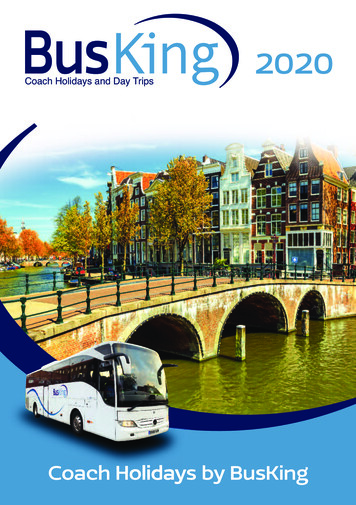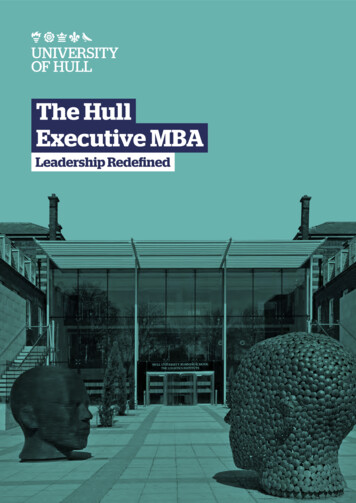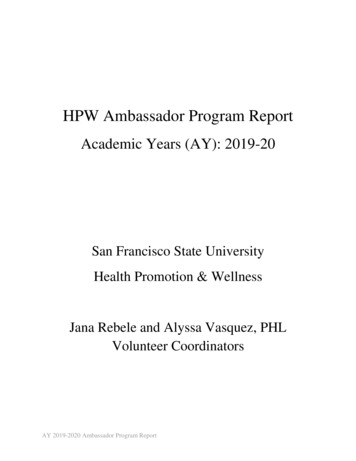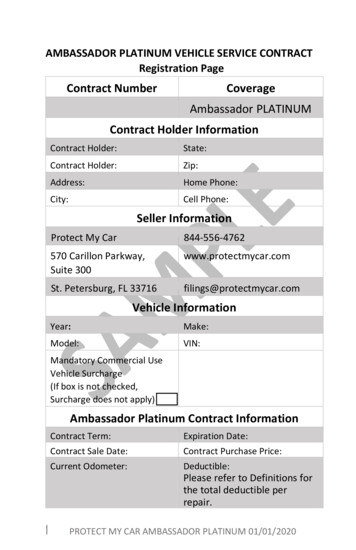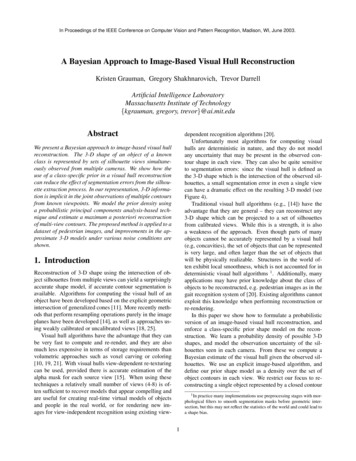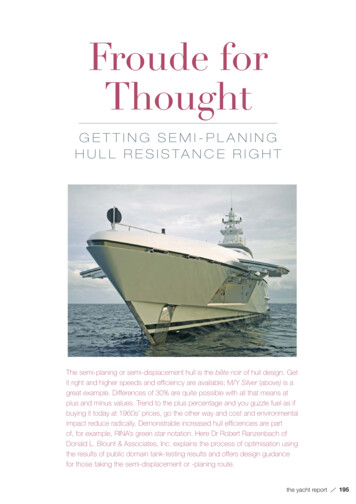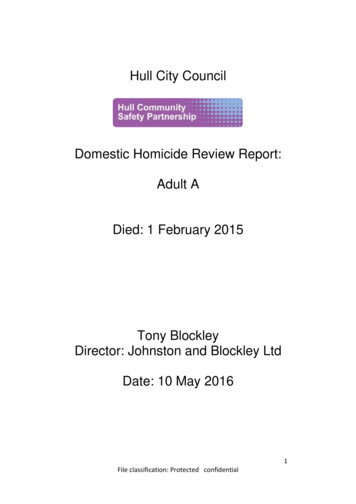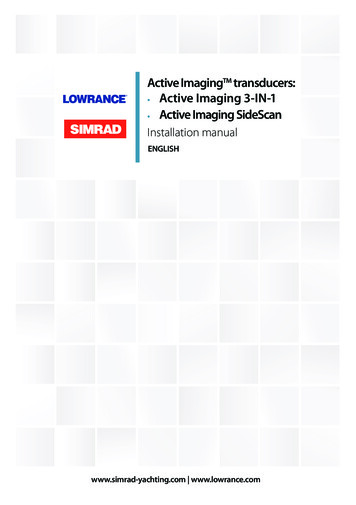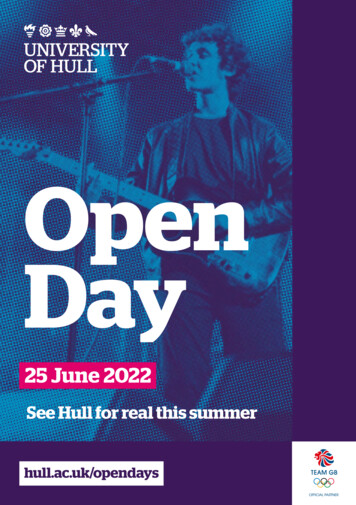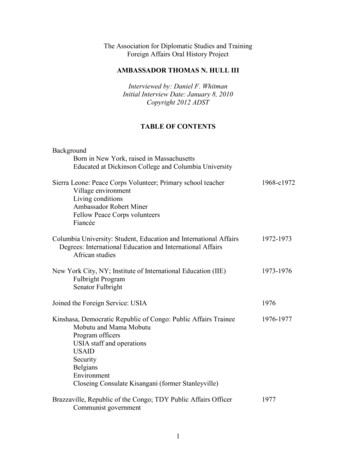
Transcription
The Association for Diplomatic Studies and TrainingForeign Affairs Oral History ProjectAMBASSADOR THOMAS N. HULL IIIInterviewed by: Daniel F. WhitmanInitial Interview Date: January 8, 2010Copyright 2012 ADSTTABLE OF CONTENTSBackgroundBorn in New York, raised in MassachusettsEducated at Dickinson College and Columbia UniversitySierra Leone: Peace Corps Volunteer; Primary school teacherVillage environmentLiving conditionsAmbassador Robert MinerFellow Peace Corps volunteersFiancée1968-c1972Columbia University: Student, Education and International AffairsDegrees: International Education and International AffairsAfrican studies1972-1973New York City, NY; Institute of International Education (IIE)Fulbright ProgramSenator Fulbright1973-1976Joined the Foreign Service: USIA1976Kinshasa, Democratic Republic of Congo: Public Affairs TraineeMobutu and Mama MobutuProgram officersUSIA staff and operationsUSAIDSecurityBelgiansEnvironmentCloseing Consulate Kisangani (former Stanleyville)1976-1977Brazzaville, Republic of the Congo; TDY Public Affairs OfficerCommunist government19771
ConcertsKinshasa, (Continued)EnvironmentMobuto’s Zairian art collectionFeccan FairPersonnel issues1977-1978Pretoria, South Africa: Assistant Cultural Affairs OfficerEffects of Soweto riotsApartheidAfrikanersNon-Afrikaner whitesCleveland International ProgramCrossroads AfricaUS policyInternational Visitors ProgramAmbassador EdmonsonAmbassador BowdlerPersonnelBlack entrepreneursOfficial entertainmentForeign Service NationalsOfficial and social contactsUS South Africa Leadership Exchange Program (USSALEP)Prominent BlacksFulbright granteesUS/South Africa relationsSouth West AfricaSouth West Africa People’s Organization (SWAPO)South Africa, a nuclear powerSpeakers ProgramHousingEmbassy personnelPolice presenceFamily1978-1980Ouagadougou, Upper Volta: Public Affairs OfficerCoupsCaptain SankarAmbassador Julius WalkerPeace CorpsCultural ProgramsPersonnelAmbassador Thomas BoyattEnglish Teaching Conference1980-19832
EnvironmentUSAID projectsLocal mediaMrs. George Bush (Barbara) visitMogadishu, Somalia; Public Affairs OfficerDictator, Sidi Barre,Ambassador Robert OakleyCharles E. WickEnglish teaching programUniversity of South Carolina programOgaden disputeGovernmentRelationsBerbera air facilityStrategic locationEthnic SomalisStaffIslamSomali languageAmerican libraryEthiopia/Somali relationsYemenCultural programs1983-1986Washington, DC: Headquarters, USIA: Executive Assistant,Office of the CounselorWorking environmentDirector Chares Wick talesReagan falls asleep at meetingOperationsReagan/Gorbachev meetingPersonnel changes/assignments1986-1989State Department: Foreign Service Institute, Czech language study1989-1990Prague, Czechoslovakia: Public Affairs OfficerPrague cityCommunismLiving environmentAnti-US radio broadcastsAmbassador Shirley Temple BlackAmbassador Black’s press interviewsEast German refugeesWest German embassyRed Cross1990-3
German communism collapseStaffSurveillanceRelationsSecret police operationsUS war memorial monumentsBratislava film exhibitVaclav HavelDissident mass demonstrationsGovernment changesVisiting VIPsCestmir SuchyClaiborne PellFilm programAmerican/CzechsUSIS historic buildingCultural programsCzech cultural personalitiesPrague CastleKatherine GrahamCzech and Slovak Republics formedAlexander DubcekLagos, Nigeria: Public Affairs OfficerUSIS divisions and operationsGovernmentAmbassador William L. SwingElections annulledAmbassador Walter CarringtonPress freedomCultural programsEnvironmentUSAIDAbujaInternal travelPresident Yar’AduaFamilyFulbright programObasanjoLagos cityEnvironmentSecurityLocal pressBrain drainNigeria as “the giant of Africa”Population-19954
Muslim/Christian conflictsWashington, DC: USIA Headquarters; Area Director for AfricaBudget austerityPost closingsUSIA/STATE amalgamation negotiationsVice-President; Bi-National CommissionsForeign post travel1995-1997Pretoria, South Africa; Minister Counselor, Public Affairs OfficerAmbassador James A. JosephBi-national CommissionAmbassador Delano LewisEmbassy personnelConsulatesNelson MandelaVice President MbekiDennis HastertCultural programsPeace CorpsGovernment RelationsVIPsUS policyAfrican National Congress (ANC)“Terror” LekotaVice President GoreUSAIDUS Government assistanceCENTEFulbright CommissionUniversity of Pretoria Center for Human RightsGill Jacot-GuillarmodCleveland International ProgramForeign Service Nationals1997-2001Addis Ababa, Ethiopia: Deputy Chief of MissionAmbassador Tibor NagyHeadquarters, African UnionChineseUS Foreign Commercial ServiceUS commercial presence Organization of African UnityEthiopia/Eritrea border conflictPrime Minister MelesUnited Nations Mission for Ethiopia and Eritrea9/11 World Trade Center attack2001-20045
Status of Forces Agreement (SOFA)Al Qaeda in AfricaRegional terrorist attacksPresident’s Emergency Plan for Aids Relief (PEPFAR)Food distributionGeorge McGovernFamineEthiopian ProtocolHuman RightsUS Addis/Asmara Embassy relationsInter-Governmental Authority for Development (IGAD)Communist DergEthipia/Somalia relationsJama Ali JamaSomalilandSiad BarreUnited States Ambassador to Sierra LeoneLocal staffEmbassyCell phonesTurk subcontractorsAmbassador ChavezCorruptionElectoral CommissionTruth and Reconciliation CommissionPresident KabbahAnti-Corruption CommissionBritishAnti-Trafficking in Persons legislationGovernmentHuman Rights CouncilUnited Nations Peace Keeping Organization (UNAMSIL)Ambassador MwakawagoUnited Nations Aid FundsElectionsNational Elections CommissionNon-Government Organizations (NGOs)Victor AngeloUnited Nations Development Program (UNDP)International Military Assistance Team (IMATT)GuineaRegional electionsSpecial Court of Sierra LeoneCharles TaylorFBI62004-2007
War crimes casesConsular servicesUSIS operationsJohn Williams Taylor libraryUSAIDAmbassador Girls’ Scholarship FundHighly Indebted Poor Country processHuman RightsPress freedomBunce IslandFourah Bay CollegeJohn F. Kennedy BuildingAmbassador’s Fund for Cultural PreservationMilitary assistanceChimpanzee reserveBruno the chimpanzeeFemale genital mutilation (FGM)HIV/AidsTribal chiefsTraditional tribal courtsAmbassadors as managersRole of the ambassadorPolitical asylumAfrican talent drainRetirement2007Simmons College, Boston MA: Warburg Professor of International RelationComments on the Foreign ServiceINTERVIEWQ: We will first identify ourselves. I am Dan Whitman and am interviewing AmbassadorTom Hull. We are sitting in a town in Southwestern New Hampshire. Ambassador Hullwhat is the name of this town?HULL: It is Grantham, New Hampshire.Q: Grantham, New Hampshire.HULL: Eastman Village, Grantham, New Hampshire.Q: Today is January 8, 2010 and the new decade. Ambassador Hull can we start at thebeginning, and can you tell the reader something about your family background.7
HULL: Sure. I was actually born in upstate New York in a little town by the name ofNiskayuna because my father was working there in the Second World War.Q: Can you spell that for the transcriber?HULL: Sure, Niskayuna which I presume is an old Indian name near Schenectady. Myfather was there in that part of the world because he was working on the first Americanjet engine as an engineer for General Electric during the war. He was actually fromOregon and northern California. My mother was from Massachusetts. Her family was anold Mayflower family going back to John and Pricilla Alden. Interestingly the family forgenerations never moved more than 15 miles or so from Plymouth, Massachusetts, untilmy grandfather in the early 1900’s moved to Boston. My mother grew up there. As soonas my parents could move after the war, my mother wanted to go back to the AtlanticOcean, so we moved back, and I grew up in Marblehead, Massachusetts. I then went offto boarding school up in Maine at the Hebron Academy where I am currently on theboard of trustees. From there I went off to college at Dickinson College in Pennsylvania.After that I joined the Peace Corps and went to Sierra Leone and thus begins my career ofinternational service.Q: Excellent. Well let’s get this full juice out of the fruit here. Do you have anyrecollections that stand out at Hebron Academy or Dickinson that comes to mind aseither out of the ordinary? What was the type of experience you had in Secondary schooland in college?HULL: Well at secondary school it was an all boys school, so it was a rather miserableexperience without any girls around. A lot of hard academic work. Maine is a very coldplace, but there was a lot of joy skiing and playing soccer and all the things you like to doat an adolescent. I was not a classroom star. In college I gave little attention to academicsand a lot of attention to meeting young women whom I had not had the pleasure ofmeeting in high school, and socializing. Although ironically about three years agoDickinson named me one of their 25 most influential alumni over their last 200 and someyears of the school’s history, including me with people like James Buchanan who was adisaster as president, and other people. I thought that was consistent; another was ChiefJustice Roger Brooks Taney who was also a disaster. But they were influential innegative ways. As I said to the college, I take my nomination to represent the fact that thecollege emphasizes international service and what I embodied was somebody whoengaged internationally somewhat successfully in my career.Q: You modestly understate that, but we will get to the details later.HULL: But I was a voracious reader when I was young, and I took an interest in theforeign service as so many people did. You mentioned you interviewed Aurelia Brazealwho was influenced by reading The Ugly American in the late 1950’s, and that bookreally kind of peaked my interest how I as an American can do better than the people whowere portrayed in The Ugly American. And of course the inference of the Ugly American8
is we wouldn’t look so ugly if we had better public diplomacy. But also I got some careerbooklets and things about the foreign service. I decided when I was an adolescent thatthis might be an interesting career. Not the career I was necessarily seeking because I hadother areas of interest, law and so forth. I thought I might become a lawyer, but certainlybecoming a diplomat was something of interest to me early on.Q: You say high school, or adolescent.HULL: I probably read The Ugly American when I was in seventh or eighth grade.Q: Well that is useful. For bibliographies of people who are interested in this line ofwork.HULL: In fact there was just an article, I have it around the house here. If I stumble on itI will share it with you. Somebody wrote we just had the 50th anniversary of thepublication of the Ugly American. It did influence a generation of people. It was a bestseller.Q: So that would have been the 1950’s.HULL: 1958 or so. “57 or ’58, I don’t remember exactly when it first came out when Iwas in seventh or eighth grade.Q: So at this time you jumped in it, looking back that was a formative thing.HULL: Very formative, yeah.Q: Well on to Dickinson and girls.HULL: Well not so much the girls as the wonderful social life.Actually I had very little tolerance for anything I was required to study, and a great dealof interest on things that I was not required to study, so I pursued my major of historywith a lot of gusto but you know, I resisted science and mathematics and all those things.Q: Ah but you didn’t resist your major.HULL: Of course not. I was the kind of person that wanted to study what I wanted tostudy and not what other people wanted me to study.Q: I remember doing that, but never living up to it.HULL: But from there I joined the Peace Corps which was especially formative in anumber of ways. Of course I met my good wife in the Peace Corps because she was afellow volunteer.Q: The year?9
HULL: Well she came a year after I was there. I joined the Peace Corps in 1968, and shejoined in 1969. I was fortunate in a sense that I had a temporary medical deferment fromthe military, and therefore was no in danger of being drafted, so I had a lot of optionswhen I left college. I could go into business.Q: I have to ask, did you graduate in ’68?HULL: Yeah.Q: So did I.HULL: Good year, like vintage wine. But I wasn’t in danger of being drafted. I learnedthat because I had a draft physical when I was in college. I was forced to have a leave ofabsence from my college years for a semester since I was on some social and disciplinaryprobation from the college.Q: We can go into that or not. Put a footnote later if you want.HULL: So I knew I was safe from that so I applied to graduate schools, business and thePeace Corps. I was offered a job with a major life insurance company. I said, “So I reallywant to do that as a living?” Then I could go get a masters degree in American historyand was accepted at a major university. I really don’t want to do that right now, howabout some adventure. I was really surprised that the Peace Corps invited me to join andsubsequently .Q: Surprised?HULL: Well I didn’t have any international background. I was an undistinguishedstudent and so forth. But anyway I had the good fortune that they said here is a live onewho we can send to Sierra Leone. Of course like anybody being sent to Sierra Leone inthose days nobody knew where in the world it was. You grabbed the EncyclopediaBritannica in those days. First the map and then the Encyclopedia Britannica where thefirst sentence said, “Sierra Leone which is also known as the white man’s grave.”Q: Because of the malaria, right?HULL: Because of the malaria in the colonial era had killed, that means missionaries,colonial administrators did not last very long. Everybody who has ever served in thePeace Corps has had that same experience of having to explain to their parents why theywere going to the white man’s grave. Before we could Google a country we went to theEncyclopedia Britannica.Q: That didn’t daunt you.10
HULL: It didn’t daunt me; I thought it was a great adventure. I wasn’t motivated verymuch by idealism. I thought it would be great if I could teach some people, but I wasprimarily interested in the adventure of going to Africa. That is where a lot of otherpeople came burdened with all the encumberments. When you joined the Peace Corpsyou were given something like 100 pounds of stuff to take. I was amazed that otherpeople brought lacrosse sticks and golf clubs and what have you to Africa. Anyway, butthat was a very important experience. We gathered together in Philadelphia for stagingbefore being sent to Sierra Leone where we were the first group to be trained in country.Up until then they had been trained in the Caribbean and the United States. It also cameabout three months after a coup d’état there in which a person, who ostensibly won anelection a year before had not been recognized as the winner, had been put into power butthey were very paranoid about foreign mercenaries, what have you. We gathered inPhiladelphia. It happened to be the Fourth of July so we all went over and saw VicePresident Hubert Humphrey give a speech at Constitution Hall, and then that night theyput us on an airplane from Philadelphia, a 707 that flew non stop to Sierra Leone. Wedidn’t know the plane had that kind of range, especially when it was packed full of PeaceCorps volunteers because this was one of the larger Peace Corps contingents in the worldin Sierra Leone. You could scarcely go thirty or forty miles without running into anotherPeace Corps volunteer. It was a very dense concentration.Q: Was this a charter plane?HULL: Chartered plane. It was World Airways. It did not re-fuel. We were landing inJuly which was the middle of the rainy seasons when they had these horrific monsoonstorms. As we approached our plane was being tossed around and so forth. We thoughtwe were going to die. Then we landed and our plane was surrounded by the SierraLeonean military with lots of guns. We were told we could not get off the airplane. Wethought it was nice that they sent out the army to welcome us, but then they came onboard with their guns going up and down the aisles checking to make sure we were notarmed. What had happened was that they did not get permission for us to come into thecountry as a Peace Corps group until after the plane was in the air. The ambassador at thetime, Robert Miner, persuaded President Shaka Stevens that these were just Peace Corpsteachers and not mercenaries, and that they should be allowed to come in. He had agreed.However Sierra Leone being inefficient and the airport being across the harbor by ferry,word had not reached the harbor that this plane should be allowed to land. As we foundout much later we were denied permission to land but we were out of fuel so we landedanyway. We didn’t have enough fuel to go on to another airport anywhere.Q: I guess the adventure was well begun.HULL: Yeah, so the adventure was well begun. So we spent four or five hours on theplane it seemed like, and they finally let us off once everything got clarified and westarted a very interesting time. But at the time a lot of Peace Corps volunteers wereleaving the country because of the turn over at the time. A number of them were arrestedbecause they had diaries. These paranoid police and soldiers thought that these werereally spies collecting information about Sierra Leone. So it was a very delicate. The First11
few months were a very delicate period as the new Shaka Stevens regime settled intopower.Q: Any second thoughts when you got into this unexpected HULL: No, not from me. I was naïve enough. We were all very enthusiastic about whatwe were going to do in this new adventure. But without going into a lot of detail in thecourse of this I made very good friends with a fellow named Roger Cohen who was acommunicator at the American embassy. He was my age and from my part ofMassachusetts. Because of a little snafu in my training I ended up having to spend a weekor two extra in Freetown and stayed with him in an American embassy apartment. Drovearound in his American Embassy convertible. Enjoyed his air conditioner, washer, dryer.We became good friends. So I actually spent a lot of time whenever I was in Freetown inthe course of years with people from the embassy, became friends with the ambassador.He had Jill and me to Christmas dinner for example. He wrote me a glowingrecommendation to graduate school which I think was very instrumental in helping meget into graduate school. But I also made lots of friends in the embassy. The DCM laterbecame an ambassador. So did also the political officer who gave me some self-helpfunds to build a school. So anyway, I got a lot of insight on how embassies operated andenjoyed the people in the embassy and thought this would indeed be an interesting career,and not nearly as onerous as being in the Peace Corps where we lived in a veryrudimentary village level.Q: Hold on for just a moment. You got funds to build a school?HULL: Well, what happened in this particular instance is USAID had given the steelstructure for a school and the village had erected the steel structure, but they couldn’tafford any cement to build the walls. And the school was run by the Catholic Churchwhich ran a lot of the schools. I was teaching in a Catholic primary school and so theycame up with a proposal. I took it to the embassy and sold it to them, and we got thecement and finished the school. It was great. It gave me insight on how some of thesethings work.Q: Just a note on the village. Were you far from the capital?HULL: Well I was within a day’s drive going on local transportation which was basicallyriding on the backs of pickup trucks, that sort of thing, but not far away. I think one of myfavorite memories was once my friend, Roger, decided that he wanted to go up countryand see somebody, and he decided to take me back to my village which was prettyremote. My first year I was the only Peace Corps volunteer who had ever served there,No running water, no electricity, just a very basic life. But once when I was down inFreetown for a Peace Corps conference or something, Roger decided he would drive meback in his Peugeot convertible over the dirt roads to the village. He had this big goldenretriever. As you know Africans are kind of sketchy about dogs anyways, very fearful.For good reason because of rabies and other things. Roger had this exotic dog for Africawhich was a golden retriever, and so we drove up to my village with a two-seater, Roger12
and me with the dog behind us. Being on dirt roads we put up the top to the convertible.Whenever I came back to the village the people immediately emerged to see what theforeigner had brought with him because if I had gone to Freetown I would have picked upfood supplies and what have you. So I got out and Roger got out, and then this big goldenretriever. You never saw people disperse as quickly as the people in this village did.Another odd thing that we had about 30 or 40 miles up the road from me was anagricultural experimental station where there was a USAID employee from one of theuniversities in Virginia. He had brought a red Corvette Sting Ray to Sierra Leone. Myvillage was odd in that the main road was paved. That was because my landlord was theminister of education and he had arranged for enough money to pave the road throughtown. So people were pleased with that road, not only for the transportation but becausethey cold lay out their rice to dry in the sun, their freshly washed clothes to dry in the sunand so forth. But the insensitive American from Virginia, when he got to the edge oftown in his Sting Ray and saw pavement, he just floored it. So I can always rememberhim driving over the rice, driving over the clothes, and being left as the symbol ofAmerica in town to explain why my compatriot was driving over all their stuff.Q: Your reading of The Ugly American came back that day.HULL: Yes, absolutely. But another up country visit I recall, there was a town nearby.The town where Jill lived and taught. She taught in a women’s teacher training college. Iwould have to go down to that village to get my mail because there was no mail deliveryto my village. I got a lot of mail because of my parents. The Boston Globe had a dealwhereby they would send the Boston Globe, every weekday and Sunday edition, overseasfor one dollar for an entire year to Peace Corps Volunteers. They would come by sea, andso when the ship came in, 30 days of newspapers would arrive at the post office for me toread. I would have to bring a back pack and haul these things. But I would go down tothis town of Port Loko where the mail would come in. There were about five or six PeaceCorps Volunteers in various schools in this town, so I would stay with some Peace Corpsfriends who are still friends to this day.On one occasion the American Ambassador decided to come up and visit us all and havelunch with us at one of the Peace Corps Volunteers’ houses. There were interestingcharacters in town. One of them was a person who was suffering from leprosy, most ofhis nose had been eaten away. He was known among insensitive Peace Corps Volunteersas “Old Faceless”. He would have this scarf that he held over his face, and then he wouldpull it off and if you gave him some money, he would cover up his raw face again. I canremember we all said we hope “Old Faceless” doesn’t show up when we are havinglunch. Sure enough there he was. He knocked on the door. We sort of explained to theambassador who this was. The ambassador very graciously got up from the lunch table,went out, greeted this man, gave him some money and everything else. I said, boy, if I amever an ambassador that is the sort of person I want to be. Wow, that is not the uglyAmerican, that is the way Americans should be. So that made a lasting impression. Therewere of course many others.13
Q: You said he was interesting. Were there other reasons other than his condition and hisremarkable figure?HULL: Memorable certainly. There were a lot of interesting characters in town, sort ofodd people but I was struck, and that was sort of my exposure too to the AmericanForeign Service. Ambassador Miner like so many American ambassadors in that periodhad so little African experience. He had been ambassador to Trinidad and Tobago so thatsort of counted as African experience, but in the 60’s there were very few Americanswith any experience in Africa. Then we had a lot of ambassadors who simply came toAfrica and learned on the job.Q: Sierra Leone only had their independence less than ten years before.HULL: Absolutely, and there were ambassadors who perhaps accompanied an assistantsecretary of state on a trip and therefore were deemed to be experts on Africa when infact they had done little more than make a trip.Q: Richard Nixon in ’57 I think as vice president went to advise his boss PresidentEisenhower what to do about these imminent independences. Nixon convinced theexecutive branch of government to create an Africa bureau knowing nothing. This is anexample of what you had, the executive branch of the government to create an Africabureau. But knowing nothing. This is an example of what you had.HULL: Exactly. You read memoirs and things of people who served in Africa. It isinteresting what little knowledge we had of the continent which was not surprising. It waswhere the great white hunters went and missionaries and not many other people. Verylittle commerce except maybe Liberia where we had rubber plantations.Q: Europeans knew their way around.HULL: Right, but Americans not so much. So I was happy to gain some expertise inAfrica because I was interested in Africa even before I joined the Peace Corps, but Iknew very little about it. But to make a very long story short, I was extremely grateful forthe extreme generosity of people who lived in my village. I was really taken aback, aseverybody is who serves in Africa, about how generous people can be who have so little.In fact if you go to the back page of the current issue of the Foreign Service Journal, youwill find a piece by Bob Griffin who went to some refugee camps in Ethiopia or inDjibouti, refugees from the Ogaden which led the fighting in Ethiopia. It is talking abouthow they gave him this watermelon they ground, you know how generous people can be.I think that is true throughout Africa. So I always felt that I wanted to give back in someway to these people who had been so generous to me. So it is one of the reasons Ieventually maneuvered to go back there as ambassador when I might have gone to anyother place. But we will come to that story later on.Q: You said it was adventure, rather than idealism, but I see a creeping idealism.14
HULL: But there is still a lot of adventure, and certainly a lot of gratitude. It really didopen my eyes. It is true culture shock for people coming straight from the United Statesgoing to live in an African village. I can remember a guy who was doing really well inPeace Corps training until he was sent out. Part of the training was to live with a localfamily in the village you were going to be assigned to. This guy from Oklahoma wasdoing just terrifically until he went to this village and had to eat with his hands. He couldnot visualize people without eating utensils. He said he would rather go to Vietnam thanthat. So there is often for people a breaking point when you have to live at that level. Inthe foreign service you don’t live at that level. You live among the elite of a countryusually.Q: Although if you are a good diplomat there are these brief moments when you do go tothe villages.HULL: Oh of course, but to live there day in and day out at the grass roots in Africa, forme it was also something I felt that was very valuable as a Peace Corps and as a diplomatwas the fact that I had lived at the grass roots level in Africa. So as I dealt with the elitesin countries I was always cognizant of the fact that there is a vast number of people inAfrica living at a subsistence level or below who we were not necessarily interacting withexcept through our USAID or Peace Corps programs. You know a surprising number ofdiplomats are former Peace Corps volunteers in Africa and I think that really strengthensour abilities. I often see a difference with those who don’t have that grass rootsexperience especially in the very poor countries. Not necessarily in South Africa forexample or a situation like that, but in some of these destitute countries. Sometimes youcan’t avoid it. People are living at impoverished levels all around you, but I think it isvery hard to understand that daily struggle to survive unless you have been immersed init.Q: So years later if you do have the privilege of air conditioning HULL: You understand how it is to live without air conditioning, how to live gettingyour water from the river and everything.Q: So President Kennedy was really on to something when he created this.HULL: Oh absolutely. I must say again to make a long story short, we just succeeded inNovember getting the Peace Corps to agree to return to Sierra Leone after 15 years away.But that is another story we can get to, because a former colleague of yours and mine isnow head of the Peace Corps, Aaron Williams. Interestingly his chief of staff is StacyRhodes who replaced Aaron in Pretoria as head of USAID. Now I know we can haveseparate discussions on that.Q: No, Aaron was quite a remarkable figure, but for the reader’s sake we are talkingabout an experience the ambassador and I shared in the late 90’s in Pretoria, but thatleaps ahead in our chronology.15
HULL: Right, that is a digression, we are digressing, but I worked as a primary schoolteacher, had terrific students, and to this day I stay in correspondence with some of thosestudents. Some have unfortunately died, but again later on in life going back asambassador, that was a tremendous asset having people who lived at
Tom Hull. We are sitting in a town in Southwestern New Hampshire. Ambassador Hull what is the name of this town? HULL: It is Grantham, New Hampshire. . HULL: 1958 or so. "57 or '58, I don't remember exactly when it first came out when I was in seventh or eighth grade. Q: So at this time you jumped in it, looking back that was a .

